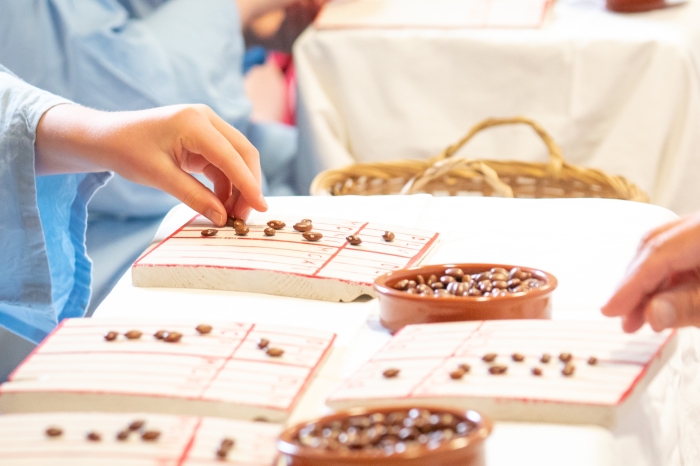We are able to offer a wide range of activities for students of all ages and abilities. Every schoolroom consists of three core authentic tasks: reading, writing on a wax tablet, and mathematics. These allow students to experience central aspects of ancient education, strengthening their literacy and numeracy skills while building links with the national curriculum. These core activities take around an hour to complete, plus about 15 minutes for putting the costumes on and taking them off. Would you like your students to experience more? Please have a look at the list of additional activities below and let us know about your preferred selection. Each additional activity adds approximately half an hour to the length of time children spend in the schoolroom.
To find out how each of the activities can work with your curriculum please click here for secondary schools and click here for primary schools.
Core activities
Reading
EVERWONDEREDWHATREADINGWASLIKEINTHEANCIENTWORLD? Just like this! Our reading tasks are replicas of the ancient exercises which means that all text is handwritten in capital letters, without spaces or punctuation, and most of it uses old-fashioned poetic language. Read Dryden’s translation of Homer’s Iliad on papyrus rolls (in the Graeco-Roman Egypt version of the schoolroom) or Dryden’s translation of Virgil on wooden tablets (in the Roman British version) and practice reading it aloud until you can read it fluently. Note that we are also happy to offer other texts suited for the students’ age and ability on request.
Writing on a wax tablet
After completing the reading exercise, use ancient writing materials to make learning poetry more interesting. This exercise involves copying poems from the walls into wax tablets with a stylus.
Mathematics
What is CCCLXII multiplied by XXVIII? How did students in antiquity perform basic arithmetic using Roman numerals? Through a series of graded practical exercises, students learn how their ancient counterparts carried out simple and more complex addition, subtraction and multiplication with the help of counters and counting-boards.
Additional activities – Options always available
Writing on ostraca
Pieces of broken pottery, called ostraca, were commonly used in antiquity as writing materials. The students use an ostracon, an inkwell, and a reed pen to copy poetry from the walls.
Advanced mathematics
Would you like to try division in Roman numerals? Calculating compound interest on a loan? Combining fractions? These and more types of calculation can be done in Roman fashion.
Latin
Our Latin exercises give everyone from complete beginners to advanced students the chance to experience how speakers of other languages learned Latin in antiquity. We usually ask two students to work together on the Latin, promoting teamwork while strengthening literacy skills and building confidence with the language.
Additional options available during selected schoolrooms
Introduction to Greek pottery and the Greek alphabet
Choose this activity to find out about stories pottery can tells about ancient Greek life and decorate your own pottery sherd with Greek letters while mastering the Greek alphabet. (The Greek alphabet is also available as a stand-alone activity.)
Spoken Latin
Salve! Visne Latine loqui? Possumus – et tu quoque potes, si conari velis.
Graffiti workshop
The ancients were just as prone to write on walls as we are, and they said many of the same things – but teachers did not let children write on the walls of their own school, so this workshop is held outside the schoolroom. It consists of an introduction to Egyptian or Roman graffiti followed by a practical session.
Reed pen making
Pens are objects we use every day, but how much do you know about their history and the ways ancients used them? Turning a piece of bamboo into a pen then using that pen to write all with a few well-thought-out movements is a magical experience – and you may keep the pen afterwards. But since this activity involves using a sharp knife, specific parental consent is required.





